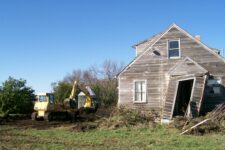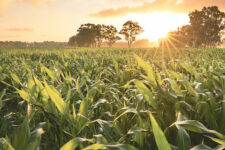Iowa is known for its agricultural heritage. The state’s endless rolling plains, nutrient-rich soil, and favorable climate have helped farmers feed the nation for generations.
Resilience runs deep in Iowa’s farming communities. Iowans have persevered through environmental challenges, embracing new ideas and adapting farming practices to preserve their land’s productivity and sustainability. As environmental concerns continue to grow, this innovative spirit has never been more important.
Excessive water usage, soil erosion, and chemical runoff have contributed to environmental degradation over the years. However, Iowa’s farmers are embracing new techniques that prioritize sustainability and environmental stewardship. Effective drainage systems play a pivotal role in this transformation. These systems improve crop yields while offering a host of environmental benefits that contribute to the long-term sustainability of agriculture.
Luft & Sons is a family business with a deep-rooted expertise in farm drainage. For generations, we’ve embraced modern technology to help support sustainable agriculture in Iowa. Our family holds an unwavering commitment to the land and farmers we serve. Keep reading to learn more about field tiling and how it supports eco-friendly agriculture.
Understanding Tiling:
Tiling involves the installation of perforated pipes, known as tile drains, to remove excess water from fields. These drains are placed beneath the soil surface at regular intervals to lower the water table.
After it rains, excess water collects in the spaces around the drainage tiles. Gravity pulls water into the perforations, where it flows through the tiling system. The system typically carries water to a main outlet, such as a ditch, stream, or drainage pond, where excess water is safely discharged without flooding or waterlogging the field.
Environmental Benefits of Tiling in Iowa:
Reduced Water Usage: Water is a precious resource. Traditional farming methods often result in excessive water usage, leading to both economic and environmental inefficiencies. However, tiling revolutionizes water management and optimizes soil moisture levels. By managing water flow through a tiling system, farmers ensure their crops receive the right amount of water. This not only saves water but also reduces energy consumption associated with pumping and treating water—a win-win for both farmers and the environment.
Soil Conservation: Healthy soil is the foundation of sustainable agriculture, but Iowa’s fertile plains are vulnerable to erosion. Conventional farming practices exacerbate this issue, leaving fields defenseless to degradation and topsoil lossage. Tiling offers a solution by bolstering soil stability and preventing waterlogging. By channeling excess water away from fields, tiling minimizes soil disturbance and preserves the integrity of Iowa’s agricultural landscape.
Reduced Chemical Runoff: Chemical runoff, including nutrients from fertilizers and pesticides, poses a grave threat to water quality in Iowa’s rivers and streams. Excessive nutrient runoff can lead to algal blooms, oxygen depletion, and ecological imbalances, compromising the health of aquatic ecosystems and endangering humans. Tiling plays a crucial role in mitigating chemical runoff by controlling the movement of water across fields. By facilitating controlled drainage, tiling minimizes the risk of nutrient leaching, ensuring that fertilizers remain where they are needed most—within the root zone of crops—rather than contaminating waterways and contributing to environmental degradation.
Tiling helps minimize soil erosion, prevents nutrient runoff, and reduces waterway pollution. By effectively managing water flow, tiling supports the long-term health of our land and waterways.
Field tiling is the best drainage solution for your farm. It’s an eco-friendly way to increase yields, reduce replanting, and improve plant roots. Contact us for a free land assessment.


